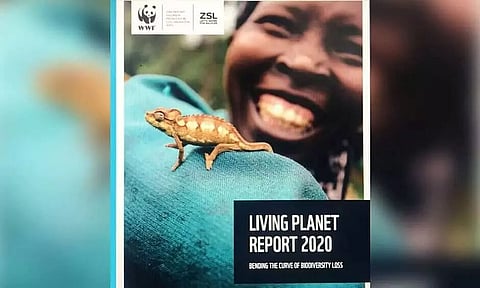
- Home
- Live Blog
- Breaking News
- Top Headlines
- Cities
- NE News
- Sentinel Media
- Sports
- Education
- Jobs

Guwahati: Amid the gloom and doom due to the COVID-19 pandemic there is more bad news on the environment front. According to a WWF report, there has been a whopping 68% decline on an average in wildlife populations over the past 46 years. The degradation has been attributed to factors like deforestation, unsustainable agriculture, and illegal wildlife trade.
Recent series of catastrophic events like wildfires, floods, locust plagues, and the COVID-19 pandemic has shaken the world's environmental conscience, the WWF said in its Living Planet Report 2020 released today.
The LPI, has tracked almost 21,000 populations of over 4,000 vertebrate species between 1970 and 2016. It shows that wildlife populations found in freshwater habitats have suffered a decline of 84 per cent - the starkest average population decline in any biome, equivalent to 4 percent per year since 1970. WWF has called for urgent action to reverse the trend by 2030.
"The Living Planet Report 2020 underlines how humanity's increasing destruction of nature is having catastrophic impacts not only on wildlife populations but also on human health and all aspects of our lives," said Marco Lambertini, Director General, WWF International.
Amidst the global pandemic, it is now more important to take unprecedented and coordinated global action "to halt and start to reverse the loss of biodiversity and wildlife populations across the globe by the end of the decade, and protect our future health and livelihoods. Our own survival increasingly depends on it," Lambertini further said.
Reversing the damage and loss of nature caused would require "bolder, more ambitious conservation efforts", the report said.
Suggesting changes needed, the report said, "making food production and trade more efficient and ecologically sustainable, reducing waste, and favouring healthier and more environmentally friendly diets and implementing these together" could go a long way in fixing the problem to some extent.
"The focus of Living Planet Report 2020 is to reiterate a scientific case for the urgent action we need to protect and restore nature and biodiversity," said Ravi Singh Secretary General and CEO, WWF India.
"For a megadiverse country like India, which has been seeing a decline in forests, natural wetlands, and marine biodiversity due to factors like urbanization, land degradation, pollution and landuse change, bolder conservation efforts are key to reversing the trend. Only an integrated approach, bringing together diverse stakeholders including governments, businesses, communities, schools, media and civil society will succeed in restoring the balance of nature. Biodiversity conservation should be a non-negotiable and strategic investment to protect the very web of life that underpins the health and livelihoods of people," the report said.